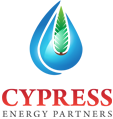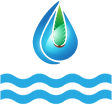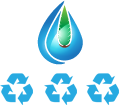 Services & Solutions
Services & Solutions
When it comes to oilfield waste, depend on our comprehensive services to minimize both environmental impact—and operator liability. Cypress Energy Partners provides targeted production-based disposal wells and gathering system solutions for the leading oil and natural gas well operators, who have expressed a critical need for additional disposal well capacity. Cypress is currently active in the Bakken, and Permian Basin with aggressive plans to expand into other basins to support our customers. We select strategic locations to support our customers operations with an eye toward to reducing transportation costs, disturbance, and damages to the roads and environment. All of our facilities are built with redundant equipment, full time attendants, and remote monitoring to minimize downtime and increase efficiency for peak utilization. With strategically located facilities we offer convenient access to the comprehensive disposal and treatment options you can count on.
For E&P waste treatment and water solutions, you need a trusted provider that you can rely upon. Cypress Energy Partners with its sponsors having over a half century of industry experience offers the best in sustainable disposal options. We are primarily focused on water resource management and solutions to support the unconventional oil and natural gas shale resource plays.
Safety
Safety is our priority every single day. Working as a team, each employee is responsible for ensuring that their coworkers return home safely at the end of the day – we take that responsibility seriously. Our intense focus on safety benefits our suppliers, shareholders, coworkers and customers. We are committed to preserving a safe and healthy workplace for all of our team members in every situation and role. We know it takes hard work to be a leading water and environmental waste solutions and pipeline inspection and integrity provider. That’s why we’re committed to maintaining the safest possible work environments in all of our operations.
All of our employees take responsibility for safety in everything they do on a daily basis including compliance with widely held standards of workplace safety, including the Occupational Safety and Health Administration, employee feedback and periodical evaluations. Safety begins on an individual level and our employees take ownership and are responsible for their own well-being and that of the people around them.
Stop Work Authority
All employees are empowered to stop any job they believe is being performed with compromised safety. This not only helps ensure employee well-being, but it also establishes field-wide responsibility for the safety of all operations.
Employee Involvement
Every effort is made to draw employees into the safety process. From one-on-one coaching and communication meetings to participation on safety committees, we require employees at all levels to be involved in our safety initiatives.
When it comes to safety, we see our workers as an extension of the safety management team. They lead us in day-to-day precautions, assist in hazard recognition, conduct behavioral observations and even drive the focus of facility inspection.
Training
Orientation Training
All new hires and contractor employees begin with a safety orientation class.
OJT Training
We have combined the On-the-Job Training process to ensure newly hired employees are given opportunities to work with experienced co-workers and are evaluated through the process.
Safety Compliance Training
All employees participate in regularly scheduled safety training courses, which are conducted throughout the year. We use one curriculum to ensure consistency in the content covered throughout our various facilities.
Safety Meetings
We conduct formal safety meetings on a regular basis to reinforce company-wide policy.
Our Business Segments
We operate our business in two segments, Water and Environmental Services and Pipeline Inspection and Integrity Services.
Water and Environmental Services
Overview. Through our Water and Environmental Services segment, which specializes in water and environmental services, we own and operate nine saltwater disposal (”SWD”) facilities, seven of which are in the Bakken shale region of the Williston Basin in North Dakota and two of which are in the Permian Basin in west Texas. We also manage four other SWD facilities and own a majority interest in our affiliate that owns a 25.0% non-controlling interest in one of these SWD facilities. We have obtained all necessary permits for an additional SWD facility in Prairie Lakes, North Dakota and are currently working toward obtaining permits for additional facilities at some of our existing locations.
Operations
Our Water and Environmental Services segment currently generates revenue by offering the following services:
Flowback water management. We dispose of flowback water produced from hydraulic fracturing operations during the completion of wells. Fracturing fluids, including a significant amount of water, are originally injected into the well during the completion process and are partially recovered as flowback water. When it is removed, this flowback water contains salt, chemicals and residual oil. The drilling and completion phase typically occurs during the first 30 to 90 days following commencement of production of the life of a well. Today, the oil and natural gas producer typically either transports the flowback water to one of our SWD facilities by truck or contracts with a trucking company for transport. Once we receive the water at one of our SWD facilities, we treat the water through a combination of separation tanks, gun barrels and chemical processes, store it as necessary prior to injection and then inject it into the SWD well at depths of at least 4,000 feet. Like produced water, we assess the composition of flowback water in our facilities so that we can maximize oil separation and treat the water to maximize the life of our equipment and the wellbore. We believe our approach to scientifically and methodically filtering and treating the flowback water prior to injecting it into our wells helps extend the life of our wells and furthers our reputation as an environmentally conscious service provider.
Produced water management
We dispose of naturally occurring water that is extracted during the oil and natural gas production process. This produced water is generated during the entire lifecycle of each oil and natural gas well. While the level of hydrocarbon production declines over the life of a well, the amount of saltwater produced may decline more slowly or in some cases may even increase over time. The oil and natural gas producer separates the produced water from the production stream and either transports it to one of our SWD facilities by truck or pipeline or contracts with a trucking company to transport it to one of our SWD facilities. Once we receive the water at one of our SWD facilities, we filter and treat the water and then inject it into the SWD well at depths of at least 4,000 feet. We also maintain the ability to store saltwater pending injection. All of our existing facilities consist of well bores drilled since Spring 2011 and were constructed using completion techniques consistent with current industry practices. We periodically sample, test and assess produced water to determine its chemistry so that we can properly treat the water with the appropriate chemicals that maximize oil separation and the life of the well.
Byproduct sales
Before we inject flowback and produced water into an SWD well, we separate the residual oil from the saltwater stream. We then store the residual oil in our tanks and sell it to third-parties.
Management of existing SWD facilities. In addition to the SWD facilities we own or lease, we own a 51.0% interest in Cypress Energy Services, LLC (“CES”), a management and development company that manages 11 SWD facilities in North Dakota, including one in which CES owns a 25.0% non-controlling interest, one SWD facility that is owned by Cypress Energy Holdings, LLC and two third-party facilities. Our responsibilities in managing an SWD facility typically include operations, billing, collections, insurance, maintenance, repairs and, in some cases, sales and marketing.
Construction management of new SWD facilities. We currently act as the construction manager for one third-party SWD facility, which we will also manage once the construction is complete. All of these managed facilities are located in North Dakota. Our responsibilities as the construction manager typically include acting as a general contractor to oversee the design and construction of the SWD facility and in some cases assisting with the permitting process.
As a region matures and the predominant activity shifts from drilling and completion of wells to production, our facilities continue to experience demand for ongoing processing of waste produced over the life of the well.
Each of our SWD facilities is currently operated 24 hours per day, 365 days per year by our employees. Our locations in North Dakota currently include onsite offices and housing for our employees. In Texas, we have an office and housing for management at our Pecos, Texas facility. We supplement our manned operations with various automated technologies to improve their efficiency and safety. We either have or are currently installing 24-hour digital video monitoring and recording systems at each facility. These systems allow us to track operations and unloading as well as the identity of customers upon arrival at our facilities. We believe that our commitment to operating our facilities with sophisticated technology and automation contributes to our enhanced operating margins and provides our customers with increased safety and regulatory compliance. In the future, we anticipate that some of our SWD facilities will be run through technological automation with off-site monitoring and control.
In addition, we intend to construct or acquire SWD facilities in new locations of high-growth resource plays throughout the U.S. In evaluating possible locations for new SWD facilities, we consider a number of factors, including the location of existing and expected drilling and production activity; the presence of competing SWD services providers; the number, size and financial strength of associated producers; the geological characteristics of the area; access to power infrastructure and roads or pipelines for transportation; and the ability to obtain the necessary permits to conduct operations. The locations on which we actually drill or acquire new SWD wells will ultimately depend upon the availability of capital, regulatory approvals, costs, actual drilling results and other factors. See “Risk Factors — Risks Related to Our Business — Our ability to grow in the future is dependent on our ability to access external growth capital.”
Customers
Our water and environmental services customers are oil and natural gas exploration and production companies, including majors and independents, trucking companies and third-party purchasers of residual oil operating in the regions that we serve.
Contracts
Many oil and natural gas producers choosing providers of sensitive environmental services engage in rigorous screening, which may include site inspections, and the process may take three to six months. We have been approved by companies such as Royal Dutch Shell, Occidental Petroleum and ExxonMobil.
Our subsidiary CES manages four SWD facilities in North Dakota that we do not own pursuant to management services agreements. Under these agreements, CES supervises and manages the development and day-to-day operations of SWD wells, as well as assists in operational issues, such as training, and developing and implementing a marketing plan.
Pipeline Inspection and Integrity Services
Overview. We believe that through Tulsa Inspection Resources, LLC (“TIR”) and its affiliates we are a leading provider of independent inspection and integrity services to the pipeline industry. We provide services for the pipelines, gathering systems, local distribution systems, equipment and facilities of its well established customer base. We provide inspection and integrity services to oil and natural gas producers, public utility companies and other pipeline operators that are required by law to inspect their gathering systems, distribution systems and pipelines. TIR’s approximately 63 pipeline inspection and integrity customers include oil and natural gas producers, pipeline owners and operators and public utility companies throughout North America. TIR offers independent inspection services for the following facilities and equipment:
- Transmission pipelines (oil, gas and liquids);
- Oil and natural gas gathering systems;
- Pump and compressor stations;
- Storage facilities and terminals;
- Gas distribution systems.
Operations
Oil and natural gas producers, public utility companies and other pipeline operators are required by federal and state law and regulation to inspect their pipelines and gathering systems on a regular basis in order to protect the environment and ensure the public safety.
At the beginning of an engagement, our personnel meet with the customer to determine the scope of the project and related staffing needs. We then develop a customized, detailed staffing plan utilizing our proprietary database of more than 10,000 professionals. Our inspectors generally have significant industry experience and are certified to meet the qualification requirements of both the customer and the PHMSA.
Our scope of services includes the following:
- Project coordination (construction or maintenance coordination for in-line pipeline inspection projects);
- Staking services (marking a dig site for surveyed anomalies);
- Pig tracking services (mapping and tracking of third-party pipeline cleaning and inspection units, called pigs);
- Maintenance inspection (third-party pipeline periodic inspection to comply with PHMSA regulations);
- Construction inspection (third-party new construction inspection/oversight on behalf of owner);
- Ultrasonic nondestructive examination services (using high-frequency sound waves to detect pipeline imperfections);
- Related data management services.
Customers
Customers in the Pipeline Inspection and Integrity Services segment are principally oil and natural gas producers, pipeline owners and operators and public utility or local distribution companies with infrastructure in North America.







